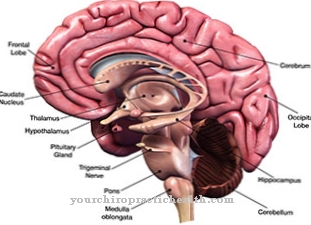Tumor pain or Cancer pain are among the worst symptoms of cancer. The pain is very pronounced in many cancer patients and therefore has a negative effect on the patient's well-being. You therefore absolutely need individual treatment by an experienced pain therapist who is familiar with the medication for tumor pain.
What is tumor pain?
Tumor pain always occur in connection with cancer and can reach a very high pain intensity. About two thirds of cancer patients suffer from tumor pain in the course of their disease, in the end stage even about 90 percent.
Since tumor pain leads to a considerable impairment of the cancer patient's quality of life, good treatment with painkillers is essential. Depending on the body region in which the cancer is located, tumor pain can affect a wide variety of parts of the body.
causes
Tumor pain can arise either through the cancerous tumor or the cancer itself, or through metastases that have spread in the body of the cancer patient during the course of the disease.
Due to their size and growth, the tumor or metastases can press on or grow into surrounding organs or nerves, causing severe tumor pain. Inflammation caused by tumor growth can also be responsible for tumor pain.
Another cause of tumor pain is the treatment of the cancer, for example surgery or amputation of the affected part of the body. In addition, drugs used in cancer therapy can have severe side effects. For example, chemotherapy or radiation often lead to tumor pain in cancer patients.
Symptoms, ailments & signs
Tumor pain occurs regularly with cancer. They come about either from the tumor itself or from the treatment. Doctors differentiate between real complaints, phantom pain and signs that have psychological causes. It is not always possible to differentiate between the named characteristics. The intensity of the pain varies greatly among those affected.
The location and type of a tumor can be decisive for this. Cancer patients describe emerging pain very differently. It is therefore not possible to establish a clear classification. Often mentioned attributes are pulling, burning and throbbing. There is also often a feeling of heat in the affected areas. The subjective experience is treated in pain therapy. Medicines should specifically combat the causes and enable a symptom-free everyday life.
The treatment of a tumor is often associated with negative side effects. Patients then complain of inflammation of the mucous membranes or [[scar pain. While these complaints can be clearly localized, many other symptoms are more psychological in nature. Sufferers complain of anxiety and depression.
Regular sleep is no longer possible at night. The ability to concentrate decreases significantly. Those affected are often exhausted.Phantom pain occurs in repeated attacks. They are often related to the removal of organs and parts of the body due to cancer.
Diagnosis & course
There Tumor pain always occur in connection with cancer, most patients already have comprehensive findings that were collected as part of cancer diagnostics.
This also includes, for example, imaging procedures such as MRI or CT of the bones, the spine and the brain. These findings are also helpful and interesting for the work of the pain therapist, as they can use them to gain an overview of the physical situation of the cancer patient and thus initiate a suitable therapy against the tumor pain.
If necessary, he will arrange further examinations in order to obtain more information about the causes of the tumor pain and the cancer patient. With the help of suitable medication, a significant improvement in quality of life and relief from tumor pain can be achieved in most cases.
Complications
Tumor pain is a physical and psychological burden for those affected. In addition to the typical pain, which increases as the disease progresses, sleep disorders can also occur. A poor night's sleep leads, among other things, to reduced performance, concentration disorders and mood swings.
Well-being and quality of life decrease sharply and favor depressive moods and anxiety disorders. Some patients develop profound depression associated with cancer, which in many cases persists after recovery. If the patient tries to reduce the tumor pain with the help of self-measures such as scratching or pressing the tumor, this can cause the growth to slip or even break open.
In this case, serious complications can arise and the patient must be treated immediately. The therapy of tumor pain is relatively risk-free for the patient. However, since in most cases very strong pain medication is used, side effects cannot be ruled out. Often the prescribed opiates cause memory disorders and make the patient physically and mentally less productive. It cannot be ruled out that the sick person may develop addictive behavior.
When should you go to the doctor?
In principle, if there is pain, a doctor should be consulted to clarify the symptoms. Since the pain leads to a severe impairment of the quality of life, it must be clarified and examined by a specialist. If the pain increases or if other areas of life are impaired, it is advisable to have the disease checked by a doctor. Despite a diagnosed tumor and regular treatment, pain or changes in known symptoms should be discussed with the attending physician. This enables corrections to an existing treatment plan.
Consultation with a doctor should also be sought if the pain occurs sporadically and there are times when symptoms are free. If the impairments and irregularities occur spontaneously in the course of everyday life, a restructuring of the everyday processes is also urgently recommended. Dangerous situations can arise due to the tumor pain, which lead to an increased risk of accidents.
If there are further irregularities, visual changes or restrictions in movement, a doctor is also required. In the case of general weakness, insomnia, interruptions in concentration and attention deficits, the person concerned needs medical help. If the daily obligations can no longer be fulfilled or if the sick person is dependent on the continuous support of other people, the changes should be discussed with a doctor.
Treatment & Therapy
For setting and dosing the drugs against Tumor pain it is very helpful if the treating oncologist works with a pain therapist who is considered to be a specialist in the treatment of tumor pain.
The World Health Organization has developed a step-by-step plan for treating cancer patients with painkillers, which pain therapists use as a guide. Depending on the type of pain, for example whether it is acute or chronic, the pain therapist will recommend different drugs that are individually adapted to the situation of the respective cancer patient.
In most cases, very strong pain medication, such as opiates, are used, which should not be addictive in cancer patients. These are often combined with other active ingredients in order to permanently improve the patient's pain situation. By combining suitable pain medication, in most cases a significant improvement in tumor pain and thus the quality of life of the cancer patient can be achieved.
The pain medication for tumor pain can either be taken in tablet or patch form. The possibility of a pain pump should also be considered in the case of severe tumor pain. In addition, experienced pain therapists take into account the psychosocial situation of the patient when treating tumor pain.
You can find your medication here
➔ Medicines for painprevention
Real prevention is developing at Tumor pain difficult. One can only try to prevent cancer from developing through preventive medical check-ups and a healthy lifestyle. If the first signs of tumor pain appear in the context of cancer, a treatment that is individually tailored to the patient should be initiated by a good pain therapist as soon as possible. In this way, a worsening of the pain situation and thus the well-being of the cancer patient due to tumor pain can be avoided.
Aftercare
Follow-up care for tumor pain is usually relatively difficult. In many cases, the pain can only be limited for a short time, but not completely healed. Therefore, the person affected with this disease should consult a doctor at an early stage and initiate treatment so that there are no other complications or complaints in the further course. Early detection of the tumor can prevent it from spreading throughout the body.
In the case of tumor pain, regular check-ups and examinations by a doctor are particularly important in order to identify further symptoms at an early stage. Most of those affected depend on various medications. It is always important to take the medicine regularly and to use the correct dosage in order to counteract the pain properly.
If anything is unclear, a doctor should be consulted first. As with any other tumor disease, support and care should be provided by your own family when it comes to tumor pain. This can also significantly reduce depression and other mental disorders. The further course cannot generally be predicted because it is very dependent on the course of the tumor disease.
You can do that yourself
Tumor pain is a typical side effect of cancer. However, there are some measures that can reduce pain and thereby improve wellbeing.
If pain occurs, the doctor must first be informed. The doctor can clarify the cause of the symptoms and prescribe a suitable antidote. If necessary, another specialist can be involved in the treatment. When planning pain reliever therapy, it is important to plan well so that sufficient medication is available even during the weekends and holidays. If necessary, the emergency medical service can be contacted.
Alternative measures promise additional help. These include heat and cold therapy, massages and physiotherapy. Stimulation also relieves discomfort and improves well-being. In consultation with the doctor, acupuncture and acupressure can be tried. Some patients also benefit from electrotherapy, in which the nerves and muscles are activated by electric shocks, thereby regulating the sensation of pain. Transcutaneous electrical nerve stimulation is also an effective remedy for tumor pain.
Muscle tension is best relieved by relaxation and massage. Typical relaxation methods such as yoga or Jacobson's progressive muscle relaxation are just as effective. If the pain is very severe or does not go away, medical advice is recommended.


.jpg)

.jpg)

.jpg)

















.jpg)



